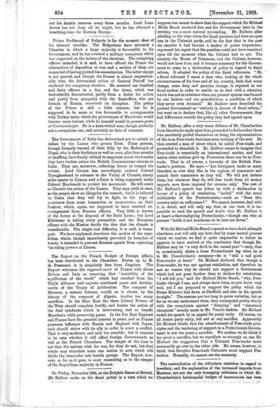With Sir Michael Hicks Beach's speech we have dealt at
length elsewhere, and will only say here that by some mental process which we confess we find it quite impossible to follow he appears to have arrived at the conclusion that though Mr. Balfour may be "a very devil in the carnal part"—may, that is, occasionally shake a loose Protectionist leg when he is in Mr. Chamberlain's company—he is "still a sad good Free-trader at heart." Sir Michael declared that though a Free-trader, he was not against retaliation, and therefore he saw no reason why he should not support a Government which had not gone further than to declare for retaliation. " will tell you," said Sir Michael Hicks Beach, "why, Free- trader though I am, and always have been, as you know very well, yet I am prepared to support the policy which the Prime Minister laid down at Sheffield, and also in his speech to-night." The reasons are too long to quote verbatim, but as far as we can understand them, they correspond pretty closely with the complaints against " dumping " and "unnatural cheapness " usually made in Mr. Vince's leaflets. Sir Michael ended his speech by an appeal for party unity. Of course, we all desire party unity, but not at any sacrifice. Apparently Sir Michael thinks that the abandonment of Free-trade prin- ciples and the tendering of support to a Protectionist Govern- ment is not too great a sacrifice. We confess we do think it too great a sacrifice, but we repudiate as strongly as can Sir Michael the suggestion that a Unionist Free-trader must necessarily go over to the other side. He seems, however, to think that therefore Free-trade Unionists must support Pro- tection. Honestly, we cannot see the necessity.


























































 Previous page
Previous page